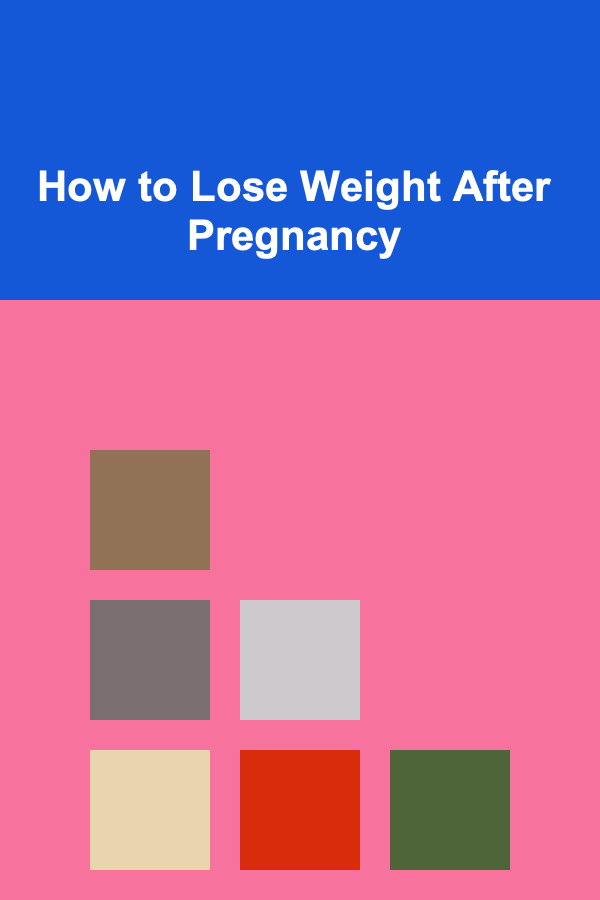
How to Lose Weight After Pregnancy
ebook include PDF & Audio bundle (Micro Guide)
$12.99$6.99
Limited Time Offer! Order within the next:

Pregnancy is a life-changing experience, filled with joy, anticipation, and sometimes unexpected challenges. After the birth of a child, many mothers find themselves facing a different kind of challenge---losing the weight gained during pregnancy. While this is a common concern, it's important to approach post-pregnancy weight loss with patience, care, and a sustainable mindset. In this article, we will delve into the various aspects of losing weight after pregnancy, including the physical changes, the psychological factors, the importance of a balanced diet, the role of exercise, and the tips and strategies that can help new mothers shed the extra pounds in a healthy way.
Understanding Post-Pregnancy Weight Gain
The Weight Gain During Pregnancy
Gaining weight during pregnancy is natural and healthy, as it supports the growing baby, placenta, and the changes in the mother's body. On average, women gain between 25 and 35 pounds during pregnancy. This weight is distributed in several areas:
- Baby weight: This includes the weight of the baby, placenta, and amniotic fluid.
- Increased blood volume: Pregnancy causes an increase in blood volume, which also contributes to the weight gain.
- Breast tissue: The breasts enlarge during pregnancy in preparation for breastfeeding.
- Fat stores: The body stores extra fat during pregnancy to prepare for breastfeeding and provide energy reserves.
After giving birth, it's normal for women to lose a significant portion of this weight, but the remaining pounds may take some time to shed.
Physical Changes After Birth
Post-pregnancy weight loss involves more than just shedding extra pounds. The body undergoes numerous changes after childbirth:
- Uterine contraction: After delivery, the uterus contracts back to its pre-pregnancy size. This process, known as involution, helps shed some of the weight immediately.
- Fluid retention: Many women experience fluid retention after childbirth. This can lead to temporary swelling, especially in the legs, ankles, and hands. Over time, the body will naturally release this excess fluid.
- Breastfeeding: Breastfeeding can help with weight loss, as it burns extra calories. However, some women may also retain weight during the breastfeeding period due to hormonal changes.
While some of the weight will naturally come off after childbirth, it's important to remember that every woman's body is different. It may take time to return to pre-pregnancy weight, and that's okay. A gradual approach to weight loss is not only more sustainable but also healthier.
Why Losing Weight After Pregnancy Requires Patience
Hormonal Changes
After pregnancy, the body undergoes hormonal changes, which can significantly impact weight loss. The hormone prolactin, which promotes milk production, can also encourage the storage of fat. This can make weight loss more difficult during the breastfeeding period. Additionally, the body's insulin sensitivity can change post-pregnancy, which may affect how easily it burns fat.
It's also important to note that the body may hold onto extra weight to ensure it has enough energy for breastfeeding. While breastfeeding burns calories, it is common for women to retain some weight during this period.
Emotional and Psychological Factors
The emotional rollercoaster of motherhood can also affect weight loss. Many new mothers experience emotional changes due to fluctuating hormones and the stress of adjusting to a new routine. Sleep deprivation, anxiety, and feeling overwhelmed can make it harder to stick to a weight loss plan. It's important to take into account the psychological impact of these changes and be kind to yourself.
In addition, many mothers face societal pressures to "bounce back" quickly after pregnancy. This pressure can lead to frustration and feelings of inadequacy. The reality is that weight loss after pregnancy is a gradual process, and there is no need to rush. A healthy, sustainable approach to weight loss should prioritize long-term wellness over quick fixes.
Diet and Nutrition for Post-Pregnancy Weight Loss
One of the most important aspects of losing weight after pregnancy is focusing on a balanced, nutritious diet. Healthy eating is crucial not only for weight loss but also for supporting overall health and well-being during the post-pregnancy period.
Focus on Nutrient-Dense Foods
Post-pregnancy, it's essential to provide the body with the nutrients it needs to recover from childbirth and care for the baby. Prioritize whole, unprocessed foods such as:
- Vegetables and fruits: Rich in vitamins, minerals, and fiber, they help keep you feeling full and satisfied.
- Lean proteins: Include sources like chicken, fish, eggs, and legumes to promote muscle repair and tissue regeneration.
- Whole grains: Foods like quinoa, brown rice, and whole wheat provide complex carbohydrates for sustained energy and fiber for digestive health.
- Healthy fats: Include sources like avocado, nuts, seeds, and olive oil, which are important for hormone regulation and overall health.
Breastfeeding and Caloric Intake
Breastfeeding burns a significant number of calories---around 300 to 500 per day. While it's tempting to restrict calories to accelerate weight loss, it's important to ensure you're still eating enough to maintain your milk supply. Extremely low-calorie diets can lead to a decrease in milk production, which is detrimental for both the mother and the baby.
Instead of drastically reducing calories, focus on making healthy, nutrient-dense choices that support both weight loss and breastfeeding. Aim for a caloric deficit of about 500 to 750 calories per day, which will lead to gradual, healthy weight loss without compromising milk supply.
Hydration
Staying hydrated is crucial for both weight loss and milk production. Drinking water throughout the day can also help reduce hunger and prevent overeating. Avoid sugary beverages, as they can lead to unwanted weight gain. Herbal teas, such as chamomile or peppermint, can also be soothing and hydrating.
Exercise for Post-Pregnancy Weight Loss
Exercise is another key factor in losing weight after pregnancy. However, it's essential to start slowly and listen to your body's cues, especially in the early months after childbirth.
Postpartum Recovery
Before starting any exercise program, it's important to allow the body time to recover from childbirth. For women who have had a vaginal birth, it's typically safe to begin light exercise (like walking or gentle stretching) around 6 weeks after delivery. However, those who have had a C-section may need to wait longer---usually about 8 to 12 weeks---before starting more strenuous activities.
Cardiovascular Exercise
Cardiovascular exercise, such as walking, swimming, or cycling, is excellent for burning calories and improving overall fitness. Aim for at least 150 minutes of moderate-intensity aerobic activity per week, or 75 minutes of vigorous-intensity exercise. Start with short sessions and gradually increase the intensity and duration as your body adjusts.
Strength Training
Strength training is an essential part of post-pregnancy weight loss, as it helps build muscle and boost metabolism. Focus on full-body exercises that target large muscle groups, such as squats, lunges, push-ups, and planks. Incorporating strength training 2 to 3 times per week can help increase muscle mass and reduce body fat.
Pelvic Floor Exercises
Pregnancy and childbirth can weaken the pelvic floor muscles. Incorporating pelvic floor exercises, such as Kegels, into your fitness routine can help strengthen these muscles and improve bladder control. Pelvic floor exercises are also important for improving posture and supporting overall recovery.
Listen to Your Body
It's crucial to listen to your body and adjust your exercise routine accordingly. If you experience pain, excessive fatigue, or discomfort, take a break and allow your body time to recover. Consult with a healthcare professional or postpartum fitness expert if you're unsure when to start exercising or if you have specific concerns.
Sleep and Stress Management
Sleep and stress management play a significant role in weight loss after pregnancy. New mothers often experience sleep deprivation due to late-night feedings and adjusting to a newborn's schedule. Lack of sleep can lead to increased hunger, cravings for unhealthy foods, and slower metabolism.
Sleep
While it may be challenging, try to prioritize sleep when possible. Take naps during the day when your baby sleeps, and don't hesitate to ask for help from a partner or family member to get extra rest. Aim for 7 to 9 hours of sleep per night, which will help regulate hormones and support weight loss.
Stress Management
Managing stress is equally important. High stress levels can trigger the release of cortisol, a hormone that promotes fat storage, particularly in the abdominal area. Practice stress-reducing activities such as deep breathing, meditation, yoga, or spending time in nature. Don't be afraid to ask for support from loved ones, and remember to take time for yourself.
Setting Realistic Expectations
It's important to set realistic expectations for weight loss after pregnancy. Rapid weight loss can be harmful to your health and may not be sustainable in the long term. Instead, aim for gradual weight loss of 1 to 2 pounds per week. Focus on adopting healthy lifestyle habits that will benefit both you and your baby in the long run.
Remember that your body has just gone through an incredible transformation. It's natural for it to take time to return to its pre-pregnancy state. Focus on progress, not perfection, and celebrate the small victories along the way.
Conclusion
Losing weight after pregnancy is a gradual and multifaceted process that requires patience, dedication, and self-compassion. By focusing on a balanced diet, regular exercise, sufficient sleep, and stress management, new mothers can successfully lose weight in a healthy and sustainable way. It's important to approach post-pregnancy weight loss with a realistic mindset and to prioritize long-term health over quick fixes. Above all, remember that every woman's journey is unique, and there is no one-size-fits-all solution. Be kind to yourself, and celebrate the incredible journey of motherhood.

How to Add Greenery to Your Home Without Spending a Lot
Read More
How to Start a Profitable Website Design Side Business from Home
Read More
Voiceover Artist's Handbook: From Beginner to Professional in the Industry
Read More
How to Start a Grant Writing Business
Read More
How To Safely Use Smart TVs and Streaming Devices
Read More
How to Make Your Own Pies and Cobblers (Advanced)
Read MoreOther Products

How to Add Greenery to Your Home Without Spending a Lot
Read More
How to Start a Profitable Website Design Side Business from Home
Read More
Voiceover Artist's Handbook: From Beginner to Professional in the Industry
Read More
How to Start a Grant Writing Business
Read More
How To Safely Use Smart TVs and Streaming Devices
Read More